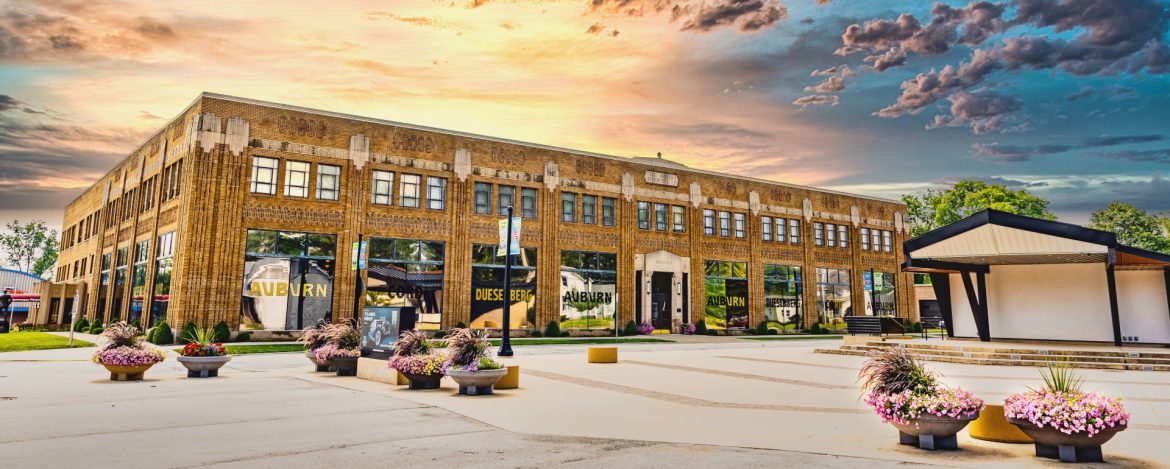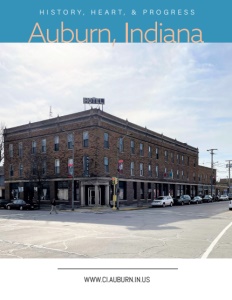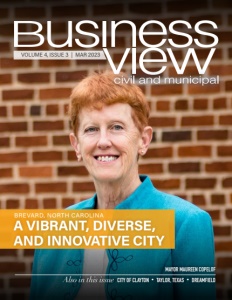Auburn, Indiana
history, heart, and progress
Providing both historical charm and a community focus, Auburn, Indiana boasts it all
While Auburn, Indiana may be known as the “City of the Classics,” thanks to its history in the automotive industry – its future is getting a lot more modern.
The DeKalb County seat, home to almost 14,000, is poised to reveal some big changes with a whole slew of new investments being announced this year to be completed throughout the next decade.
“I believe Auburn, Indiana is on the very verge, in the next five to seven years of seeing the largest economic investment period in the history of the city,” says Auburn Mayor Mike Ley. “We are looking to see some huge, huge dollars of investment.”
These investments will happen throughout the town but are largely focused on the west and downtown areas of Auburn. On the west side, Auburn has attracted a well-connected commercial developer, Veritas Realty, from Indianapolis who will be developing a 23-acre parcel of land to include a series of big-chain commercial enterprises. That includes a Texas Roadhouse, Chipotle, Verizon, Belle Tire and others to be announced in the coming months.
Veritas Reality is also currently constructing a McAlister’s Deli and WellNow urgent care on a separate parcel of land. Other developments on the west end include a Salsa Grille and a new multi-tenant commercial development.
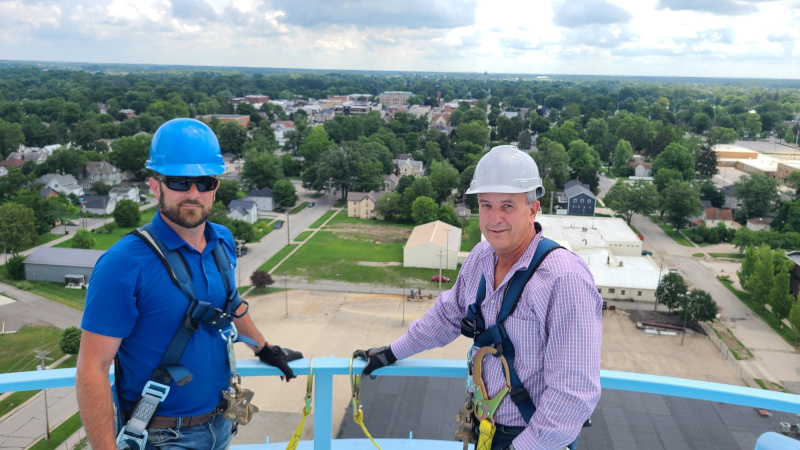
Auburn Mayor Mike Ley (right) and Water Department Superintendent Randy Harvey are pictured atop one of the city’s water towers.
“There’s so much major commercial development happening on the west side of town that we need to expand the city limits,” Ley says. “We’re working right now to annex another 327 acres into the city.”
Those extra acres will incorporate a major medical and higher education building, as well as a professional class-A business park, and 55-acres for multi-family housing and a mixed-use development.
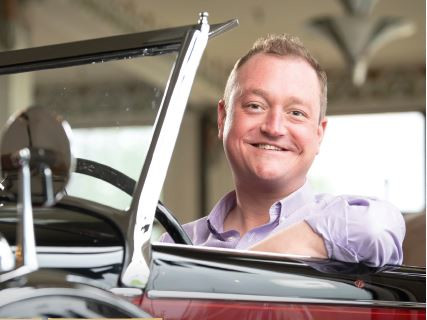
Brandon Anderson, Executive Director and CEO of the Auburn Cord Duesenberg Automobile Museum
Downtown, Auburn has already seen expansive growth and it’s gearing up for even more. Most recently, the city’s core has seen new sidewalks, new lighting, refurbished streets and parking, and the expansion of many amenities. It’s been a huge boon, according to Brandon Anderson, who is the executive director of the city’s Auburn Cord Duesenberg Automobile Museum.
“As a resident, and also from my position, too – because we’re able to be successful when you live in a successful town and people want to be here – the investment that’s been put into Auburn and been put into downtown is incredible,” Anderson says. “People come here and they’re like ‘everything just looks great! It’s taken care of.’ People come here and they see that there’s a lot of investment in this town and a lot of pride in it and that makes people want to be here, too.”
While Mayor Ley must remain hush-hush on further investment coming to Auburn’s downtown, he promises it’s going to be well worth the wait.
“It’s a challenge for a mayor because we know what’s being talked about, but we can’t talk about it. It’s all confidential stuff,” he says. “But I can tell you that what’s going to happen in downtown Auburn in the next couple of years is going to be great. We’ve got a lot of major things that are being planned. Moving forward downtown is going to get another huge shot in the arm here in terms of development and commercial activity, and maybe some housing with it.
“There’s going to be some real excitement that’s going to happen when announcements are made here.”
Despite all the major changes coming to Auburn in the coming years, the city is still home to a wealth of history and culture. First established as a city in 1900, Auburn rose to prominence as the “City of Classics.” Philanthropist and businessman Charles Eckhart opened his Eckhart Carriage Company in the city during the late 1800s and along with the help of his sons Frank and Morris established the Auburn Automobile Company in 1900.
“The little company flourished into a major boutique, handmade, automobile company,” Anderson recalls.
The company was soon taken over by E.L. Cord, who acquired the Duesenberg brand.
“They were engineers and racers, and they created the finest of luxury engines and automobiles. These were vehicles that not the one percent drove, but the 0.1 percent. These were the most expensive vehicles of the time period. They outclassed and out-competed every other vehicle along the road,” Anderson said.
“So our small town had a global impact because the Auburn Automobile Company had dealerships in 89 different countries. People still come to Auburn as an automotive Mecca because it was worldwide. This small town created some of the finest cars of American history and even European history.”
The city’s automotive history is memorialized inside the Auburn Cord Duesenberg Automobile Museum, which Anderson calls “the automotive church.” Constructed in 1930 as the international headquarters for the Auburn Automobile Company, the building is lauded as one of the greatest examples of Art Deco architecture in the Midwest.
“You step in those doors, and you experience firsthand what E.L. Cord and those designers were experiencing – the 12,000 square-foot Art Deco showroom, the marketing offices, design studios, clay modeling studios, executive offices, board room, etc.,” Anderson says.
The museum is one of the top automotive museums in the country and consistently draws visitors from all 50 states and more than 40 countries worldwide. The building is over 100,000 square feet, with more than 120 vehicles on display.
“Pretty much everybody is blown away when they come through the museum for the first time and realize all that is here,” Anderson says. “It’s one of the most unique places and we are a core part of this town.”
Eckhart and his philanthropy roots run deep in the city, including in the city’s Eckhart Public Library, built in 1910 with his support. The library is a place to embrace the city’s historical and modern cultural achievements, says Katie Mullins, executive director of the Eckhart Public Library.
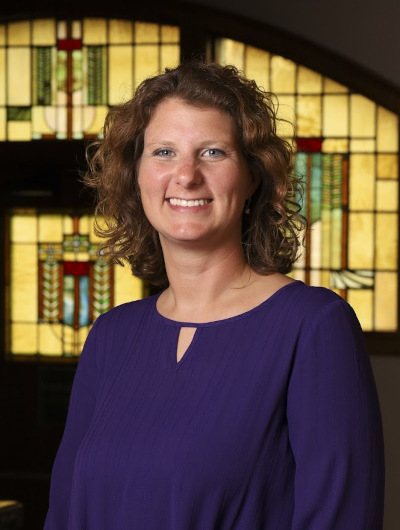
Katie Mullins, Executive Director of the Eckhart Public Library
“We have the history side of our building, and we love to give tours. We have an extensive art collection that people can come visit, and we have a beautiful fountain behind the library that was also donated by Charles Eckhart in 1910,” Mullins explains. “We can incorporate that historical side of the city, as well as the future and the modern present day for our patrons.”
The library is home to its own genealogical center that draws people from out of town to come to research their roots, as well as a teen center that allows the city’s younger citizens a place to hang out, read, craft, or play video games in a safe and welcoming environment. The library hosts a variety of events and offers a place to check out new books – and also some unconventional items as well.
“You can come to a library for a book, or you can come to a library and check out crutches if you so need from our Library of Things,” Mullins explains. “You can get a KitchenAid mixer, or a hotspot if you need internet service. There are all sorts of things literally and figuratively that we offer.”
Eckhart’s impetus for the library was to provide a community center that was welcoming for everyone.
“He wanted to develop a place that was not for any particular class or group, but it was for every citizen,” Mullins says. “That’s the foundation the library was built on, and that really kind of goes through the whole city as well.”
Eckhart’s legacy and philanthropy shine through almost every aspect of the city. Auburn is a place where citizens care about one another and want to help each other create a welcoming place, just like he did at the turn of the century.
“This community supports themselves and gives back and has a lot of great initiatives and grassroots efforts that people are supportive of,” Mullins says.
That can be seen through organizations like The James Foundation, which supports social platforms and provides educational and cultural opportunities within the city, as well as the Community Foundation DeKalb County, which provides endowments to various areas of the community.
“Our community is so philanthropic,” Mullins says. “If you have a million dollars or $100 you can contribute. You can give your $100 to the Community Foundation to an endowment of your choice and it’s pooled with other money and just invested into perpetuity.”
Auburn’s economic advancements, rich culture, and community-driven mindset have put the city on the map and have attracted many people to come to live, work and visit the area. It’s repeatedly been ranked in the top 10 safest cities in Indiana, and consistently ranks highly on quality-of-life indexes, Ley says.
But what drives people to call Auburn home? Ley makes sure to ask that question every time he meets a new resident, and what often comes up is the quality of amenities, the cultural opportunities, and the kindness of its citizens.
“We have world-class, top-quality venues and organizations that when you look at them you go, ‘Wow! This little town of 14,000 has this quality of amenities in it. What’s that about? Think about that. You go into some other communities, and you don’t see that. You have to wonder what’s here that’s hosting and keeping this here?” Ley says.
“Obviously there’s a lot of things that go into what it is that drives people to move here, live here, work here, raise their family, but we care about each other, we care about our world. It’s a very caring community.”
“Auburn is definitely a city on the move.”
AT A GLANCE
Auburn, Indiana
What: Fast-growing municipality with loads of historical charm
Where: DeKalb County, Indiana
Website: https://www.ci.auburn.in.us/
